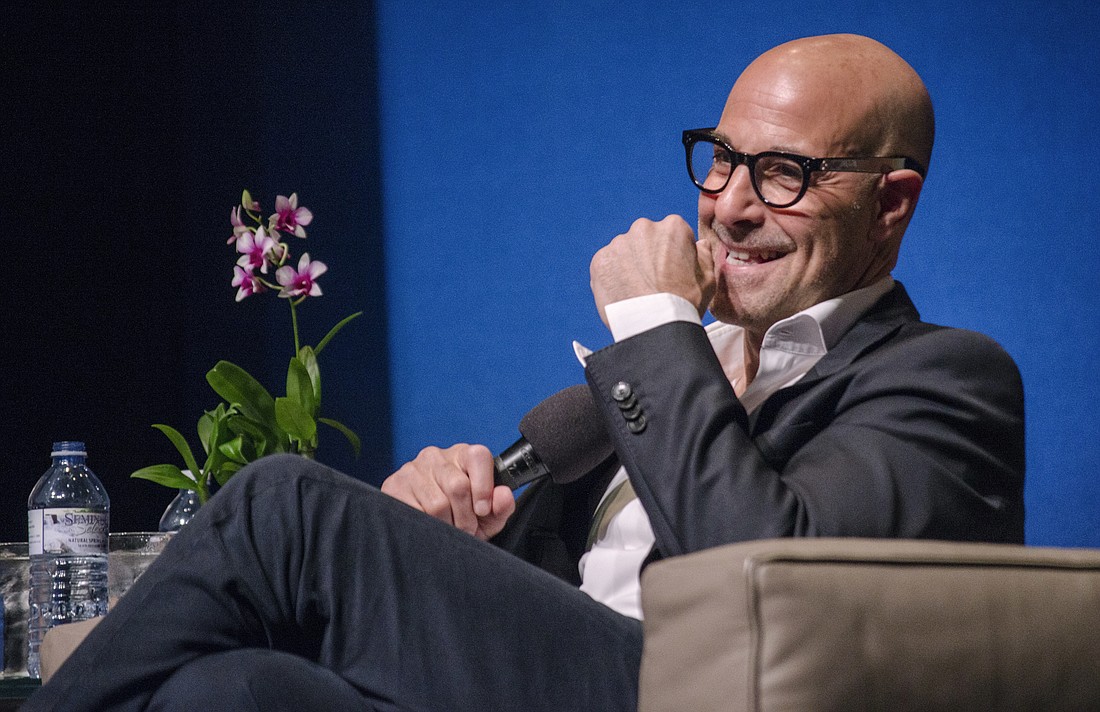- January 4, 2025
-
-
Loading

Loading

It’s hard to name a professional hat that Stanley Tucci hasn’t worn.
Writer, actor, producer, director - he’s done it all.
But whatever the role or medium, Tucci said the formula to a moving performance is the same, if not contradictory.
“You have to start with the truth of it,” Tucci said during Sarasota Film Festival’s In Conversation with Stanley Tucci at Florida Studio Theatre’s Keating Theatre on April 9.
However, the truth is not necessarily what an actor feels.
“People confuse the two,” Tucci said.
In fact what an actor feels during a performance is ultimately irrelevant, particularly on stage.
“What you feel is of no consequence to me,” he said. “What you make me feel as an audience member is what’s important. You could feel nothing on stage, nothing. I don’t care. As long as I’m crying or laughing as an audience member. That’s all.”
And then Tucci disclosed the disillusioning truth.
“It’s just pretend,” he said, prompting laughter from the audience. “You may feeling nothing. You may just be really good at faking it.”
Moderator and film critic David Edelstein then asked if acting was indeed a battle against dishonesty, to which Tucci wholeheartedly agreed.
“Without question,” he said. “Even though that sounds like the exact opposite of what I just said.”
But he clarified.
“It is a fight against dishonesty. What’s more dishonest is the actor trying to make himself feel something, to get across his emotion … and if that’s not working it becomes completely self serving. That’s dishonest,” Tucci said, “and selfish. What’s more honest is ‘I must serve the play and I must serve the audience.’ … That’s honest.”
Tucci’s laundry list of films include early indie-classics like “The Big Night” and notable blockbusters like “Julie & Julia” and “The Devil Wears Prada,” in which he acted opposite Meryl Streep.
“There were times when you’re acting with Meryl where you’re just sort of looking and you go ‘Good god, she’s so good,” he said. “And then you go ‘Oh ****, it’s my line.’”
He sung her praises even as the audience roared with laughter.
“She’s so good!” he said. “She’s so captivating! ... I’m very enamored with Meryl as Paul (Child) was of Julia (Child).”
In an era where many actors, including Streep, are using their platform to articulate their political beliefs, it was no surprise that Edelstein questioned Tucci on the actor's recent comments in support for the National Endowment for the Arts.
“My political opinions aren’t really of any importance, necessarily,” Tucci said. “If I’m asked I’ll say something. You do what you can to make a difference, but I am concerned with this administration that (the National Endowment for Arts) will disappear. I have a funny feeling it probably will … Which is unfortunate because I don’t think art is a luxury, I think it’s a necessity. I think it’s a huge part of a healthy society.”
Whether Tucci was talking the future of the arts or imitating his two-year-old son’s bewilderingly posh British accent, the intimate audience in Keating Theatre was entertained by the actor’s dry sense of humor until the very end.
In its final minutes the program was opened up to audience questions.
“When you’re talking about the most honest thing is to get up on stage and pretend in order to serve the audience, to what extent is that true here, up on stage as yourself answering questions in an interview?” an audience member asked.
“That’s a very good question,” Tucci said. “Next.”
The audience roared.